Distribution agreements are the backbone of many businesses, ensuring that products reach consumers efficiently and effectively. These agreements outline the terms and conditions of the distribution relationship between manufacturers and distributors, and play a crucial role in the logistics and supply chain of a company.
Without them, we may not have access to the wide variety of products available in our local stores, or have to pay higher prices for goods that have to travel long distances. In this article, we will explore the importance of distribution agreements and the key elements that make them effective.
Table of Contents
Distribution Agreement Templates
Distribution agreement templates are documents that outline the terms and conditions of an agreement between a distributor and a manufacturer or supplier. These templates can help to formalize the relationship between the two parties, and provide clarity on matters such as pricing, shipping, and other relevant details.
They are often used in business-to-business relationships and can be customized to suit the specific needs of the parties involved. Using a distribution agreement template can save time and effort by providing a starting point for negotiations and reducing the risk of misunderstandings.
What is a distribution agreement?

A distribution agreement is a legal contract between a manufacturer and a distributor that outlines the terms and conditions of the distribution relationship. The agreement specifies the responsibilities and obligations of each party, including the distribution territory, exclusivity, pricing, marketing, and other important details.
In a distribution agreement, the manufacturer typically grants the distributor the right to sell and distribute its products within a specified territory. The distributor, in turn, agrees to purchase the products from the manufacturer, promote and market the products, and sell them to retailers or directly to consumers.
The agreement may also include provisions related to pricing, sales targets, advertising and marketing, and dispute resolution. The manufacturer may also require the distributor to meet certain standards or comply with certain regulations.
How does distribution work?
Distribution refers to the process of getting goods and products from manufacturers to consumers. It involves a series of activities, including transportation, warehousing, and logistics, that are necessary to move products from the point of production to the point of consumption. The distribution process typically involves multiple intermediaries, such as wholesalers, retailers, and distributors, who play a key role in getting the goods to the end consumer.
Manufacturers typically sell their goods to wholesalers or distributors, who then sell them to retailers. Retailers then sell the goods to consumers. This process is known as the “supply chain.” Each intermediary in the supply chain takes possession of the goods and is responsible for getting them to the next intermediary or the end consumer.
In some cases, manufacturers may sell goods directly to consumers through their own retail outlets or online stores. This is known as “direct-to-consumer” distribution.
Distribution can also be characterized by the type of intermediaries involved. There are two main types of intermediaries: merchant intermediaries, who take possession of the goods, and agent intermediaries, who help to negotiate sales but do not take possession of the goods.
Overall, distribution is a critical function for manufacturers and businesses, as it allows them to efficiently move goods to market and reach a wide range of customers.
Differences Between Sales Agents and Distributors
Sales agents and distributors are both intermediaries that help manufacturers to sell their products, but they have different roles and responsibilities.
A sales agent is an intermediary who represents a manufacturer and helps to negotiate sales with customers, but does not take possession of the goods. Sales agents are typically independent contractors who are paid on commission and do not have the right to make binding agreements on behalf of the manufacturer. They act as an extension of the manufacturer’s sales force, and their main goal is to find new customers and close sales.
A distributor, on the other hand, is an intermediary who takes possession of the goods and sells them to retailers or directly to consumers. Distributors purchase products from the manufacturer at a discounted price and resell them at a markup. They are responsible for the storage, transportation, and distribution of the products, and may also provide marketing and promotional support. Distributors typically have the right to make binding agreements on behalf of the manufacturer, and are not paid on commission.
In summary, Sales agents are mainly focused on finding new customers and closing sales, while distributors are focused on the logistics and distribution of the products to the retailers or end consumers.
What Are the Key Terms of a Distribution Agreement?
The contract covers various key terms that are essential for a successful partnership. Some of the key terms that are typically covered in a distribution contract include:
Territory: The contract specifies the geographic area in which the distributor has the right to sell and distribute the manufacturer’s products. This can be a specific region, country or even worldwide.
Exclusivity: The manufacturer may grant the distributor exclusive rights to sell and distribute its products within a certain territory. This means that no other distributor can sell the same products in that area.
Pricing: The contract outlines the prices at which the distributor will purchase the products from the manufacturer, and the prices at which they will resell them to retailers or consumers.
Minimum Purchase: The contract may specify a minimum purchase requirement for the distributor, which means that the distributor must purchase a certain minimum quantity of products from the manufacturer.
Marketing and Promotion: The contract may include provisions related to advertising, marketing, and promotional activities. The manufacturer may require the distributor to participate in certain marketing campaigns or to adhere to certain marketing guidelines.
Quality control: The contract may include provisions related to quality control, specifying the standards that the products must meet and how defects will be handled.
Duration and Termination: The contract typically specifies the duration of the agreement and the conditions under which it can be terminated by either party.
Dispute Resolution: The contract may include a dispute resolution provision that outlines the process for resolving any disputes that may arise between the parties.
Essential Elements to Include in Your Distribution Contract
When drafting a distribution contract, there are several key terms that should be considered in order to ensure that the agreement is fair and legally enforceable. These include:
Exclusive vs. non-exclusive: The contract should specify whether the distributor has exclusive or non-exclusive rights to distribute the product. Exclusive distribution agreements prohibit the manufacturer from appointing other distributors in the same territory, while non-exclusive agreements do not.
Territory: The contract should clearly define the geographic territory in which the distributor has the right to distribute the product. This can be a specific country, region, or even a global territory.
Minimum purchase/sales requirements: The contract should specify the minimum purchase and/or sales requirements that the distributor must meet in order to maintain their distribution rights.
Term of the agreement: The contract should specify the duration of the distribution agreement, as well as any renewal or termination provisions.
Pricing: The contract should clearly state the pricing terms, including the suggested retail price, any discounts, and any special terms related to payment and credit.
Marketing and advertising: The contract should specify any marketing and advertising obligations of both parties and any related expenses.
Intellectual property rights: The contract should clarify who owns the intellectual property rights to the product and any related materials, and whether the distributor has the right to use the manufacturer’s trademarks and branding.
Warranties and indemnification: The contract should include any warranties or indemnification provisions that protect both parties from liability.
Dispute resolution: The contract should specify how disputes will be resolved, whether by arbitration or through the courts.
Distributor Agreement Vs. Dealer Agreement
A distributor agreement and a dealer agreement are both types of agreements that involve the distribution and sale of goods, but they have some key differences.
A distributor agreement is a contract between a manufacturer and a distributor, where the distributor is granted the right to distribute and sell the manufacturer’s products within a specific territory. The distributor acts as an intermediary between the manufacturer and the end customer, and typically has more control over the distribution and sales process than a dealer.
A dealer agreement, on the other hand, is a contract between a manufacturer and a dealer, where the dealer is granted the right to sell the manufacturer’s products. The dealer acts as a reseller of the manufacturer’s products, and typically has less control over the distribution and sales process than a distributor.
In general, distributors usually have more autonomy and control over the distribution and sales process than dealers. Distributors are typically responsible for marketing, advertising, and other promotional activities, while dealers are typically only responsible for selling the products to customers. Additionally, distributors usually purchase the products from the manufacturer at a wholesale price and resell them to retailers or other customers, while dealers typically purchase the products at a suggested retail price and resell them to end customers.
It is also important to note that the terms and conditions of both types of agreements are different and should be carefully reviewed, and it is recommended to consult an attorney to ensure that the agreement complies with applicable laws and regulations.
Advantages of Having a Distributor Agreement
A distributor agreement can provide several benefits for both the manufacturer and the distributor. Some of the key benefits include:
Increased market reach
By partnering with a distributor, a manufacturer can expand its reach and access new markets that would be difficult or costly to reach on their own.
Increased sales and revenue
A distributor can help increase sales and revenue for the manufacturer by managing the distribution and sales process and reaching a larger customer base.
Reduced costs
A distributor agreement can help reduce costs for the manufacturer by allowing them to focus on production and product development while the distributor handles the distribution and sales process.
Brand building
A distributor can help build brand awareness and credibility for the manufacturer by managing the marketing and advertising of the products.
Improved customer service
A distributor can provide better customer service and support to end customers by having a local presence and being able to respond to customer needs and concerns more quickly.
Access to local knowledge and experience
A distributor can provide the manufacturer with local knowledge and experience that can be valuable in navigating the local market, laws and regulations.
Legal protection
A distributor agreement can help protect the manufacturer’s intellectual property rights, pricing, and other important details of the distribution process.
Exclusive distribution
A distributor agreement can give a distributor exclusive rights to distribute the manufacturer’s products within a specific territory, which can help prevent competition from other distributors and increase the distributor’s market share.
FAQs
How long does a distributor agreement last?
The duration of a distributor agreement is specified in the contract, it could be for a specific period of time or indefinitely. The agreement could also include renewals or termination provisions.
Is it necessary to consult an attorney when drafting a distributor agreement?
Yes, it is recommended to consult an attorney when drafting a distributor agreement to ensure that the agreement complies with applicable laws and regulations, and that all the key terms are included and properly stated.
Can a distributor agreement be terminated?
Yes, a distributor agreement can be terminated under certain conditions specified in the contract. These can include the failure of either party to meet the terms of the agreement, breach of contract, or mutual agreement between the parties.
Can a distributor sell to other distributors or only to end customers?
It depends on the terms of the agreement. A distributor agreement can grant exclusive or non-exclusive rights to the distributor. An exclusive agreement prohibits the distributor from selling to other distributors or resellers, while a non-exclusive agreement allows the distributor to sell to other distributors or resellers.
Can a distributor agreement include a non-compete clause?
Yes, a distributor agreement can include a non-compete clause, which prohibits the distributor from competing with the manufacturer or engaging in similar business activities within a specific territory or time period after the agreement is terminated.
Can a distributor agreement include a confidentiality clause?
Yes, a distributor agreement can include a confidentiality clause, which prohibits the distributor from disclosing confidential information about the manufacturer or the products to third parties.
How does a distributor agreement impact the manufacturer’s relationship with other distributors or dealers?
A distributor agreement can impact the manufacturer’s relationship with other distributors or dealers in various ways, depending on the terms of the agreement. An exclusive distributor agreement may prohibit the manufacturer from appointing other distributors in the same territory, while a non-exclusive agreement may not. It is important for the manufacturer to consider the potential impact on other distributors or dealers before entering into a distributor agreement.








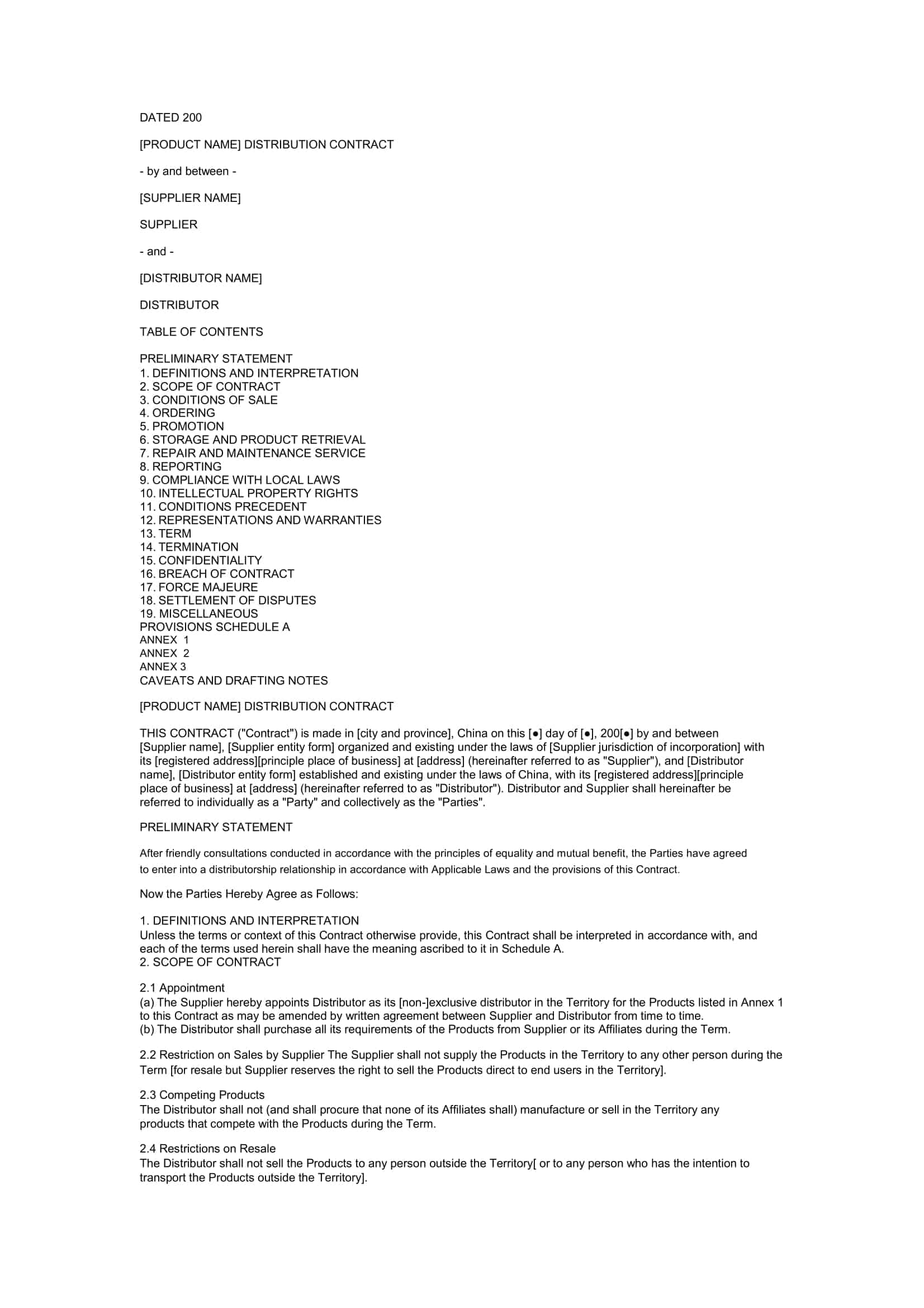





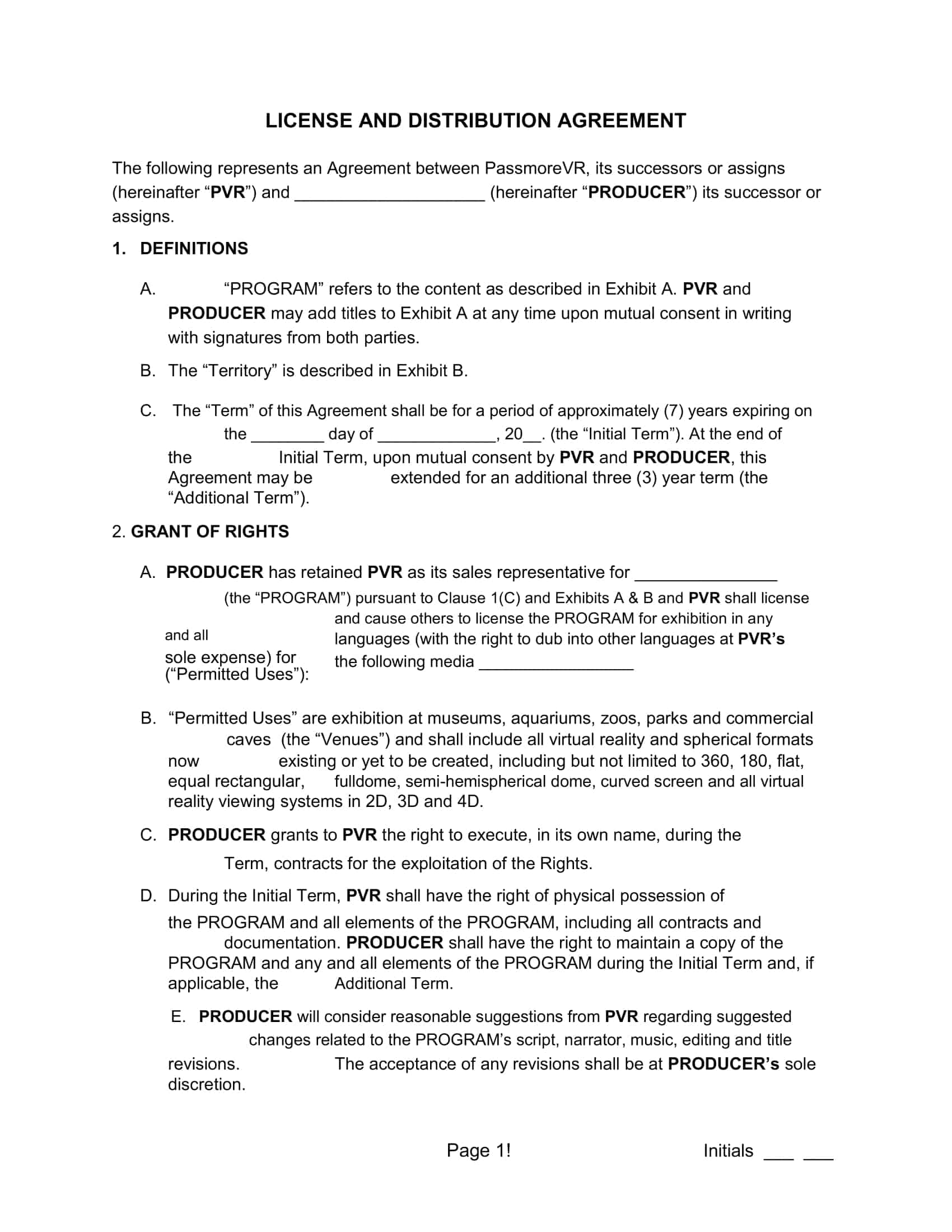



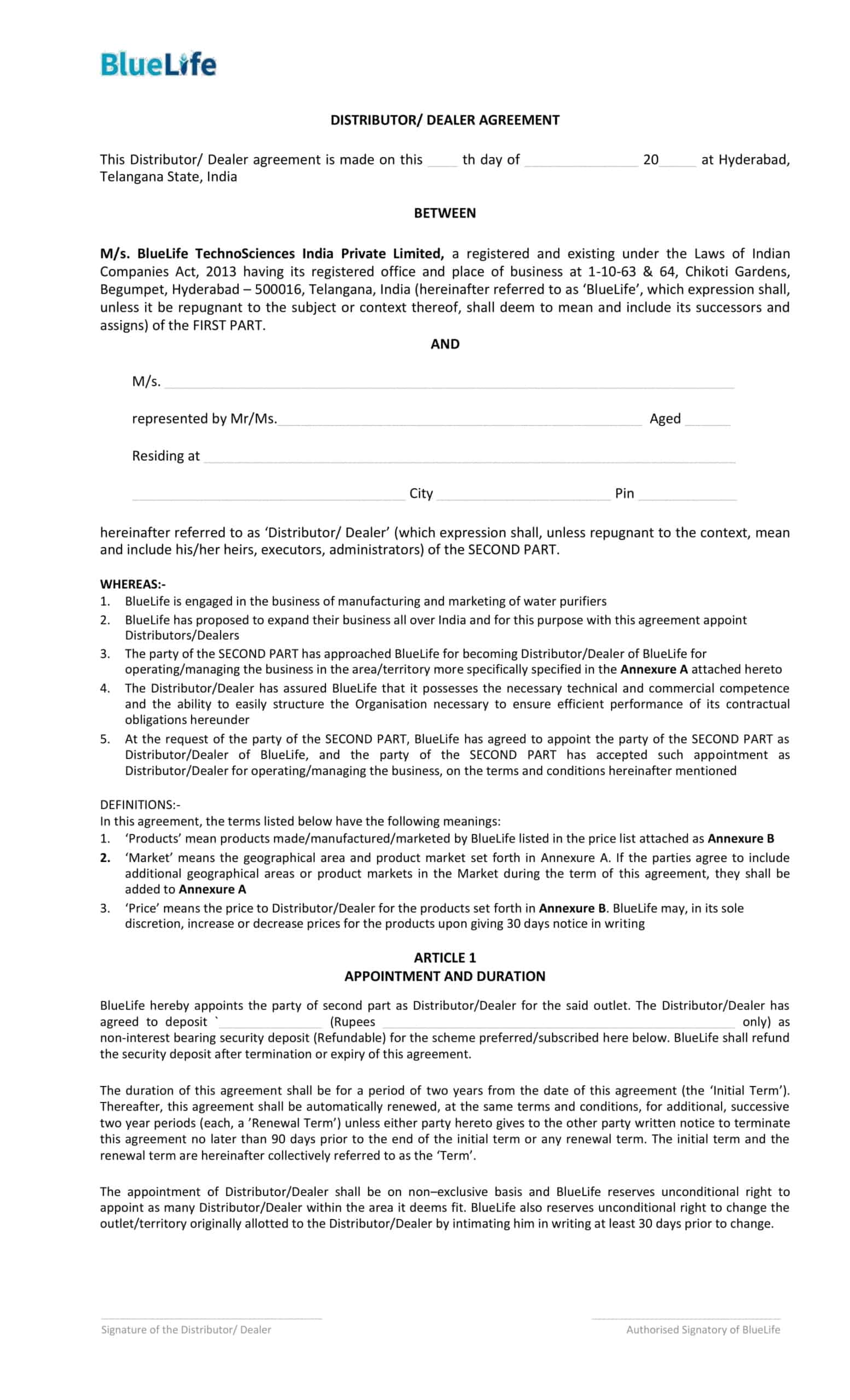






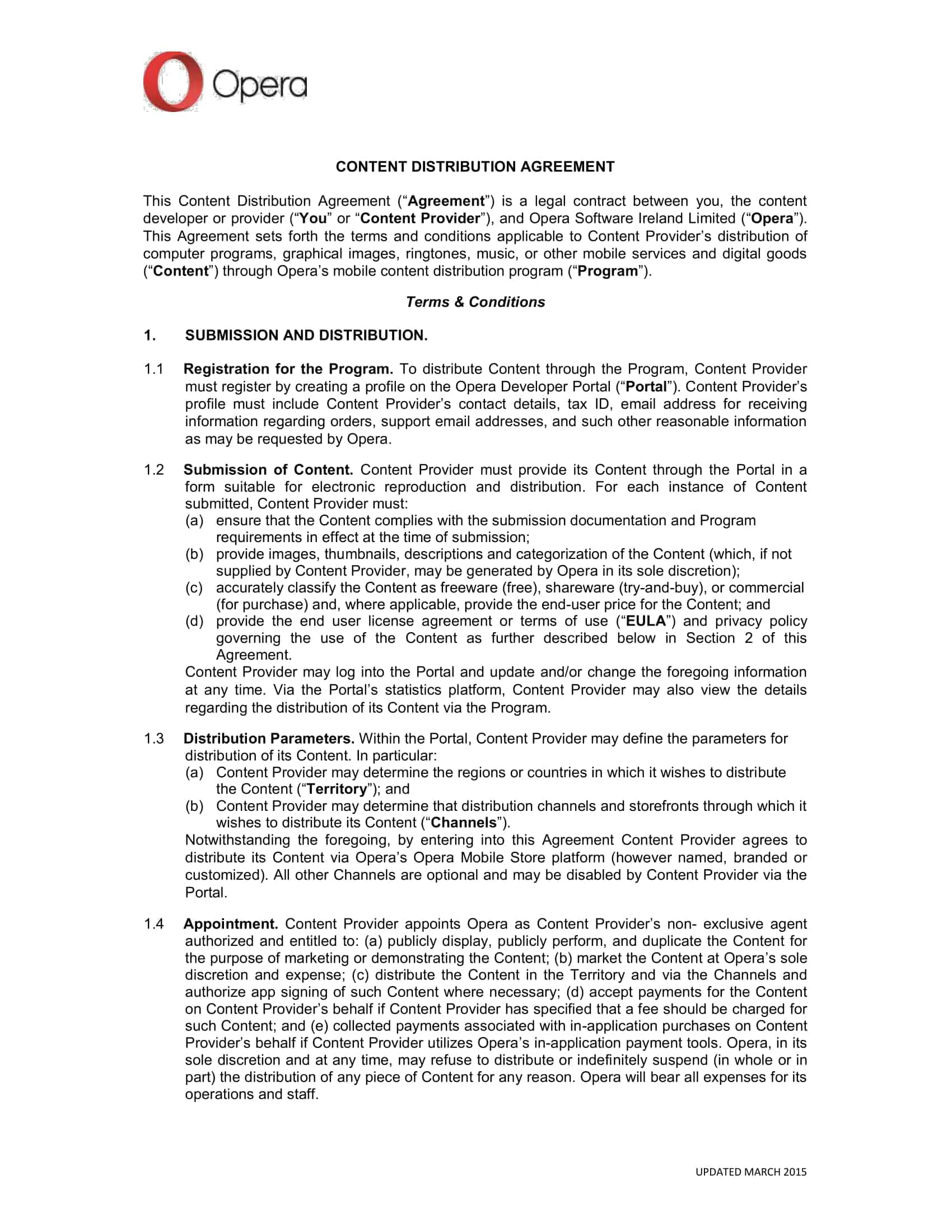

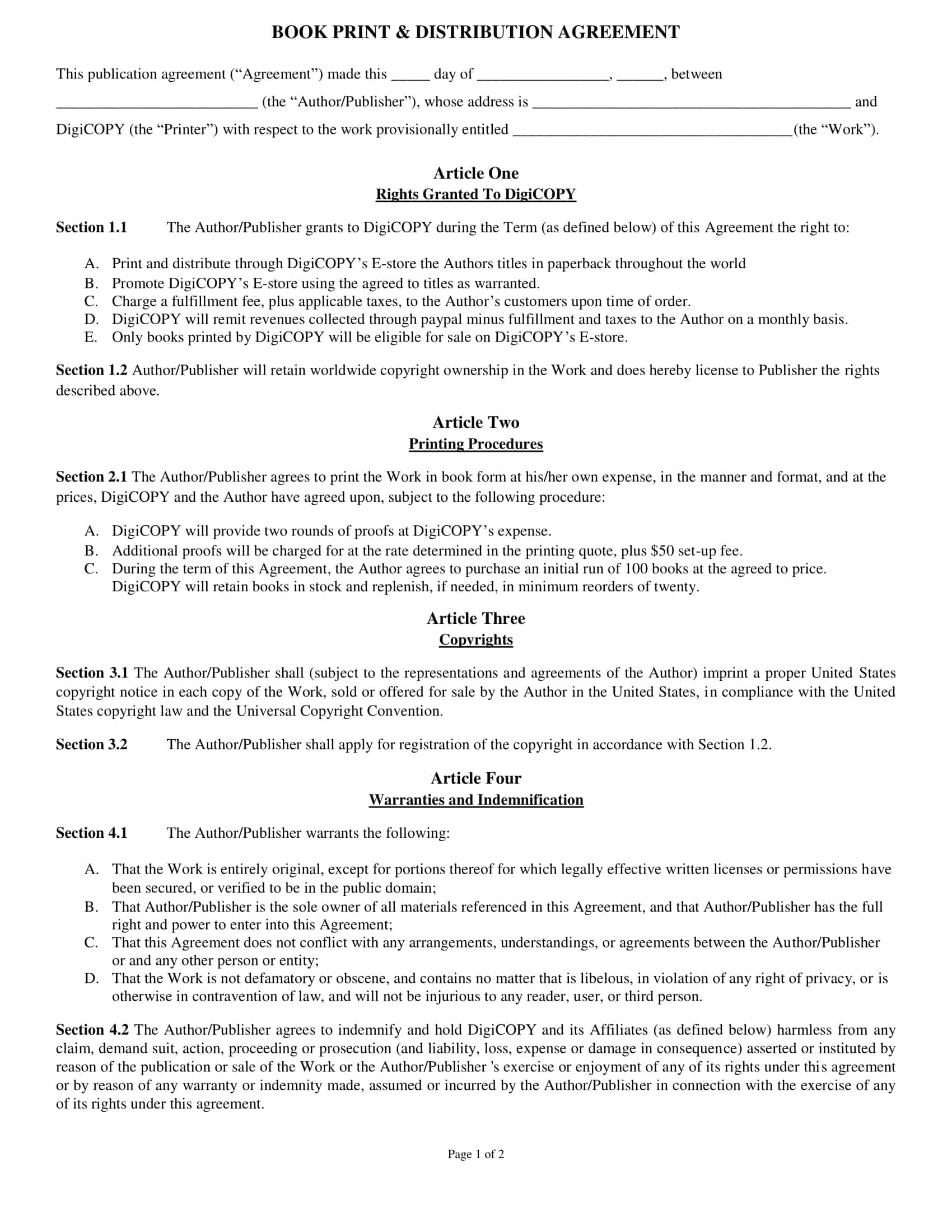








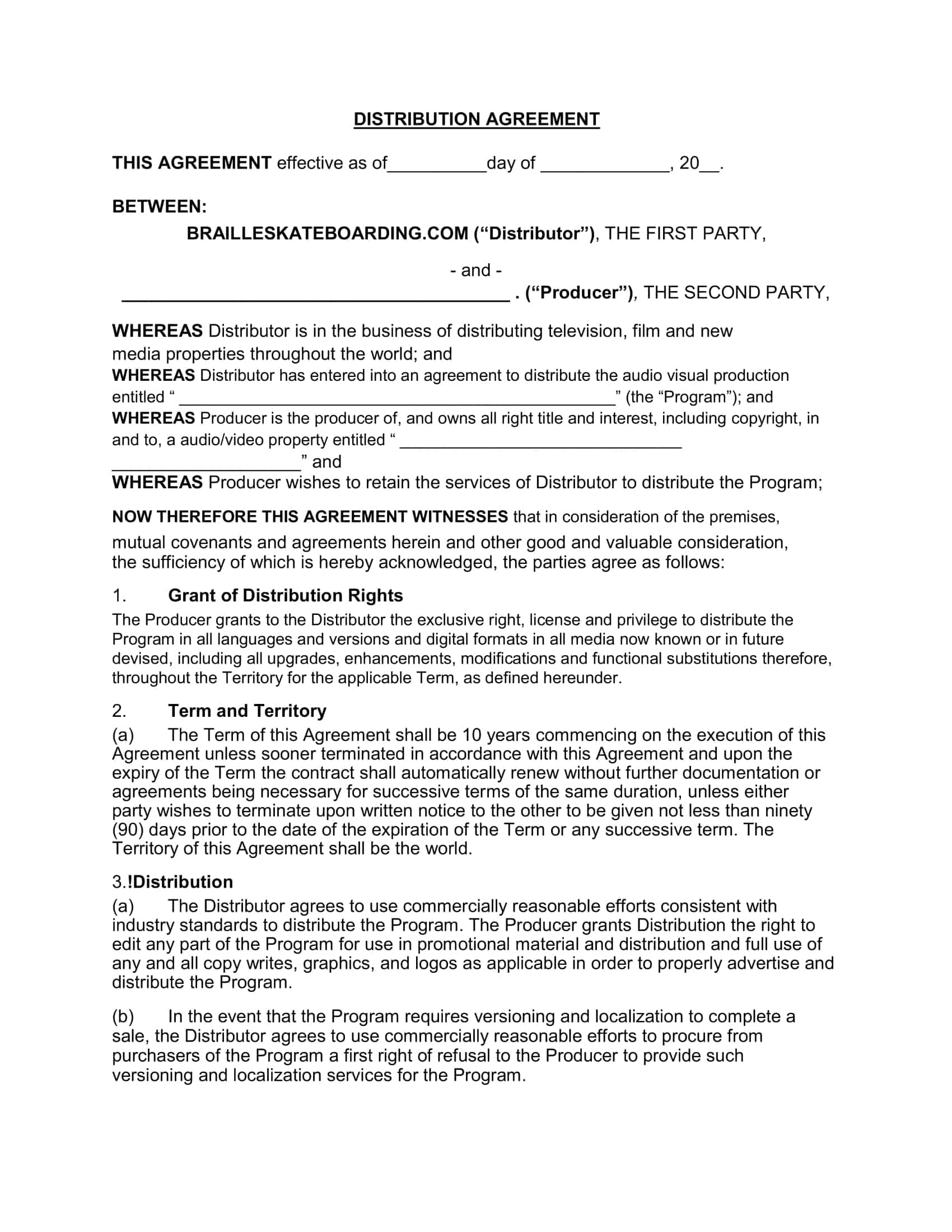










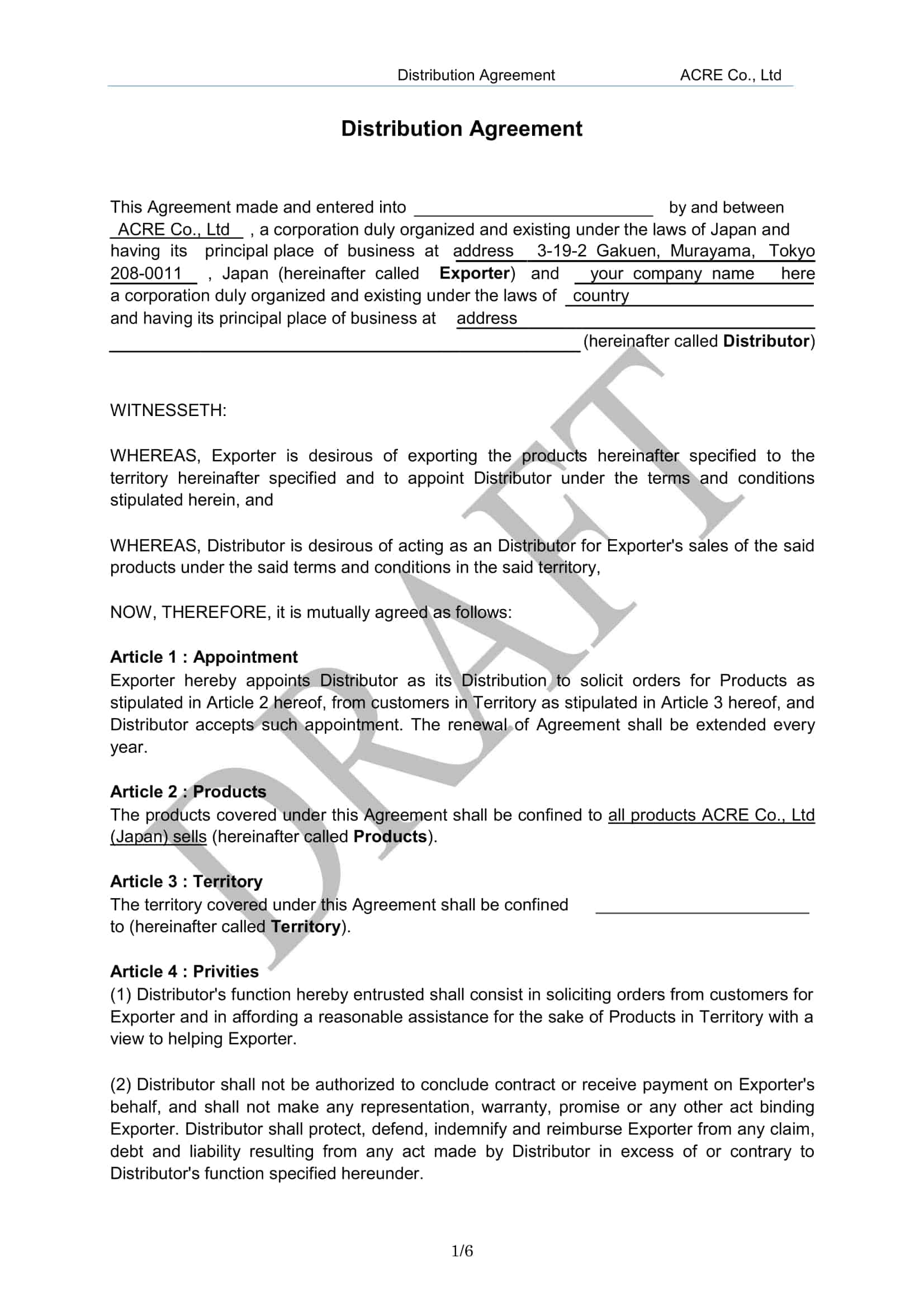

![Free Printable Roommate Agreement Templates [Word, PDF] 1 Roommate Agreement](https://www.typecalendar.com/wp-content/uploads/2023/06/Roommate-Agreement-150x150.jpg)
![Free Printable Payment Agreement Templates [PDF, Word] 2 Payment Agreement](https://www.typecalendar.com/wp-content/uploads/2023/05/Payment-Agreement-1-150x150.jpg)
![Free Printable Credit Card Authorization Form Templates [PDF, Word, Excel] 3 Credit Card Authorization Form](https://www.typecalendar.com/wp-content/uploads/2023/06/Credit-Card-Authorization-Form-150x150.jpg)
